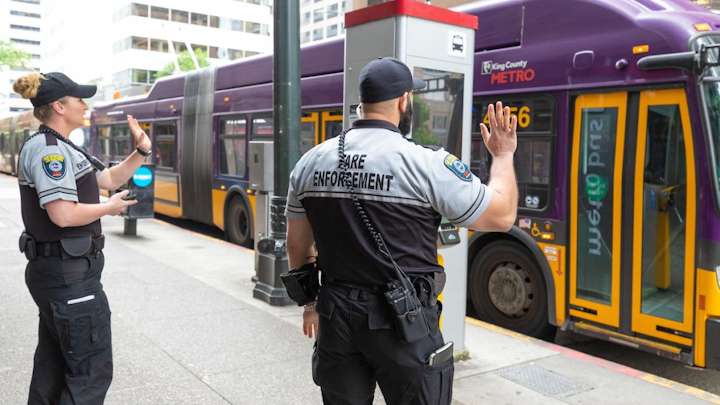
In State v. Mitchell the WA Court of Appeals Division I decided that a fare enforcement officer (FEO) may detain a passenger for a period of time necessary to identify a bus rider and may also issue a notice of civil infraction when a passenger fails to pay the required fare or produce proof of payment when asked, if the infraction occurs in the officer’s presence. Finally, a “passenger” includes a person that the FEO observes stepping off the bus.
Here, Mitchell was convicted of Unlawful Possession of a Firearm in the First Degree. The firearms were discovered when a fare enforcement officer stopped him to check proof of fare payment after he exited a Metro bus. Mitchell argues he was unlawfully detained and the trial court erred by not suppressing evidence of the firearms.
The Court of Appeals reasoned that RCW 35.58.585(1) allows metropolitan municipal corporations to designate individuals to monitor fare payment. These persons have all the powers granted to enforcement officers under RCW 7.80.050 and 7.80.060. This means an FEO can issue a notice of civil infraction when the infraction occurs in the officer’s presence, request identification, and detain a person for a period of time reasonably necessary to identify the person. Also, under RCW 35.58.585(2)(b) the law specifically grants FEOs the additional authority for the following:
(i) Request proof of payment from passengers; (ii) Request personal identification from a passenger who does not produce proof of payment when requested; (iii) Issue a citation and (iv) Request that a passenger leave the bus or other mode of public transportation when the passenger has not produced proof of payment after being asked to do so by a person designated to monitor fare payment.
Here, the defendant challenged the legality of the stop. He argued that the word “passenger” includes only those persons physically present on a mode of public transportation. Under this theory, an FEO may request proof of payment from someone currently traveling on a bus, because that traveler’s freedom of movement is already restricted by his or her presence on a moving vehicle. However, once the person disembarks the bus, additional authority is needed to request proof of payment, because to do so an FEO must first stop the person.
Unfortunately for Mitchell, the WA Court of Appeals disagreed. They said that here, there is no question Mitchell was a passenger. The FEO witnessed Mitchell disembarking the bus. He asked Mitchell and the other departing passengers for their proof of payment as they stepped off the bus. By using the bus, as a passenger, Mitchell had already incurred the obligation to display proof of payment when asked. Under these facts, the FEO acted within the scope of his statutory authority by requesting proof of payment from Mitchell. Additional authority to detain was unnecessary.
Also, because Michell did not have ID on himself, the FEO had the authority to detain Mitchell for the time reasonably necessary to identify him. Accordingly, the FEO radioed for assistance and, within minutes, police arrived and confirmed Mitchell’s identity. At each step of this encounter, the FEO acted within the scope of his statutory authority.
The Court of Appeals upheld Mitchell’s conviction for Unlawful Possession of a Firearm First Degree.
Please contact my office if you, a friend or family member are charged with a crime. Hiring an effective and competent defense attorney is the first and best step toward justice.






